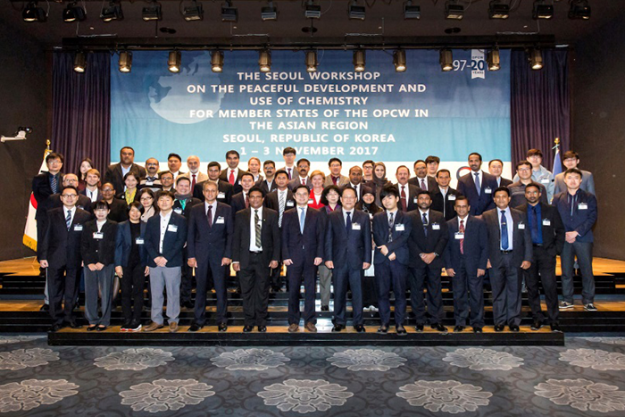
Participants at OPCW’s Sixth Workshop on Peaceful Development and Use of Chemistry in Seoul, Republic of Korea
THE HAGUE, Netherlands — 13 November 2017 — Advancement of key chemical safety and security risk management were at the core of the Sixth Workshop on Peaceful Development and Use of Chemistry, carried out by the Organisation for the Prohibition of Chemical Weapons (OPCW) in Seoul, Republic of Korea, from 1 – 3 November 2017, in collaboration with the National Authority of Korea.
The workshop, conducted by the Organisation for the Prohibition of Chemical Weapons (OPCW), presented safety and security risk assessment methods to develop effective safety and security framework in small- and medium-sized chemical enterprises, as well as understanding the approach employed in reducing risks of chemical disasters and preventing misuse of chemicals.
Mr. Yong-jin Baek, Director, Disarmament and Non-Proliferation Division, Ministry of Foreign Affairs, inaugurated the workshop in the presence of Jai youl Yang, Managing Director from Korea Specialty Chemical Industry Association and the OPCW representatives.
“Korea’s strong support for the implementation of the Chemical Weapons Convention and their voluntary contributions are invaluable to various areas of the Organisation, including multiple capacity-building workshops and activities,” noted OPCW’s Senior International Cooperation Officer, Mr Rohan Perera, in his opening remarks.
The workshop covered a broad range of issues, including Korean chemical industry’s safety management, chemical safety and security risk assessment for accident prevention and preparedness, substances used for accident prevention, best practises on chemical security to prevent misuse of chemicals, and mitigation of chemical security threats. Moreover, the participants learned about best practices in Responsible Care.
The 36 attendees representing 31 OPCW Member States comprised a diverse group of individuals ranging from government officials responsible for chemical industries, small to medium-sized chemical industry professionals, to academics and chemists. The speakers were specialists from Korea and experts from the OPCW.
Background
As the implementing body for the Chemical Weapons Convention, the OPCW oversees the global endeavour to permanently eliminate chemical weapons. Since the Convention’s entry into force in 1997 – with its 192 States Parties – it is the most successful disarmament treaty eliminating an entire class of weapons of mass destruction.
Over 96 per cent of all chemical weapon stockpiles declared by possessor States have been destroyed under OPCW verification. For its extensive efforts in eliminating chemical weapons, the OPCW received the 2013 Nobel Prize for Peace.
